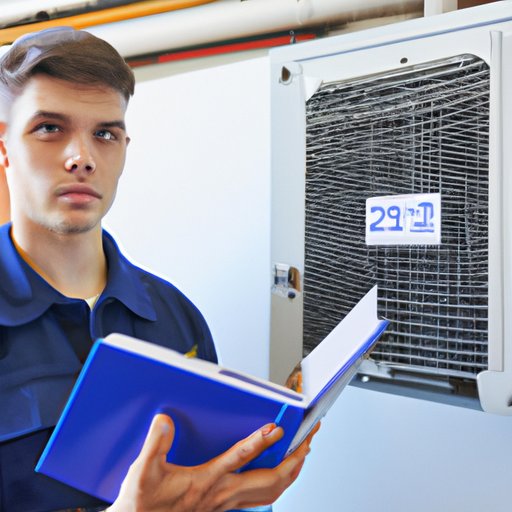Introduction
The Heating Ventilation Air Conditioning (HVAC) industry is a growing field with many opportunities for career advancement. In order to work in this sector, you need to have a certain level of certification or training. But with so many options available, it can be difficult to know exactly what path to take or how long it will take to get certified. This article will explore the different paths to certification and how to maximize your time and resources when pursuing an HVAC certification.

Exploring the Different Paths to HVAC Certification
There are several routes you can take to become certified in HVAC. Each one has its own benefits and drawbacks, so it’s important to understand what each option entails before making a decision. Here are some of the most popular paths to HVAC certification:
Apprenticeships
One of the most common ways to become certified in HVAC is through apprenticeships. These programs usually involve working with experienced professionals in the field, learning from them and gaining hands-on experience. Apprenticeships typically last two to five years, depending on the program. During this time, you will learn the basics of HVAC installation, maintenance and repair, as well as safety regulations. You may also receive additional certifications, such as those offered by the Environmental Protection Agency (EPA).
Online Courses
If you don’t have the time or resources to commit to an apprenticeship, online courses are another way to gain HVAC certification. These courses provide a comprehensive overview of the principles and practices of HVAC technology, and can be completed at your own pace. The cost of these courses varies, but they are generally much more affordable than traditional apprenticeships.
On-the-Job Training
Another option is to pursue on-the-job training. This involves working with a team of professionals to gain hands-on experience in the field. This is a great way to get a feel for the industry and develop your skills without committing to a long-term program. However, it can be difficult to find open positions for on-the-job training, so it’s important to do your research ahead of time and be prepared to apply for any positions that become available.
How Long is it Going to Take to Get Certified in HVAC?
The length of time it takes to get certified in HVAC depends on the route you choose. Apprenticeships typically take two to five years to complete, while online courses can be completed in as little as six months. On-the-job training is the quickest option, as it can be completed in a matter of weeks or months, depending on the availability of positions.
How to Make the Most of Your HVAC Certification Timeline
No matter which route you choose, there are several things you can do to make the most of your time and maximize your chances of success. First, it’s important to develop strong time management skills. This means setting realistic goals and sticking to them. It’s also important to stay organized and prioritize tasks in order to stay on track. Additionally, it’s important to set aside time for self-care and relaxation, as this will help you stay motivated and focused on achieving your goals.
The Benefits of Having an HVAC Certification
Having an HVAC certification opens up a world of job opportunities. Many employers prefer to hire candidates who have been certified, as it demonstrates a level of knowledge and proficiency in the field. A certification can also lead to increased salary and career advancement opportunities. Additionally, having a certification can give you a competitive edge over other applicants and make you more attractive to potential employers.

What You Need to Know Before Starting an HVAC Certification Program
Before starting an HVAC certification program, it’s important to understand the prerequisites and associated costs. Depending on the program, you may need to have a high school diploma or GED, as well as a valid driver’s license. Additionally, you may need to pass a background check and drug test. The cost of certification programs can vary, so it’s important to do your research and compare prices before committing to a particular program.

Maximizing Your Time and Resources When Pursuing an HVAC Certification
When pursuing an HVAC certification, it’s important to make the most of your time and resources. Researching the various options available is essential, as it will help you identify the best path for you. Additionally, it’s important to utilize all available resources, such as mentors, study materials and practice exams. This will help you gain a better understanding of the material and prepare for any exams you may need to take.
Conclusion
Getting certified in HVAC can be a rewarding experience, but it requires dedication and hard work. There are several paths you can take to become certified, and the length of time it takes to get certified depends on the route you choose. It’s important to research your options, set realistic goals and utilize available resources to maximize your chances of success. With the right approach, you can achieve your goals and reap the rewards of having an HVAC certification.
(Note: Is this article not meeting your expectations? Do you have knowledge or insights to share? Unlock new opportunities and expand your reach by joining our authors team. Click Registration to join us and share your expertise with our readers.)
